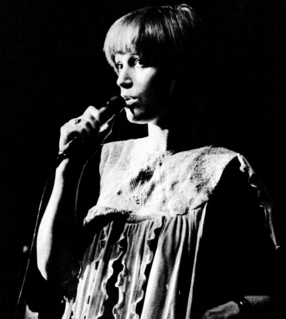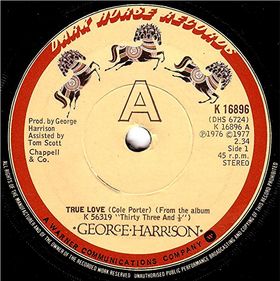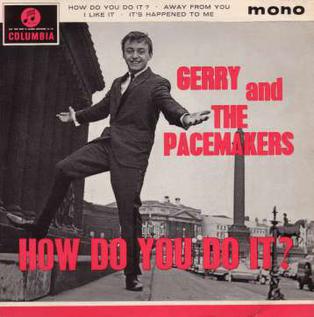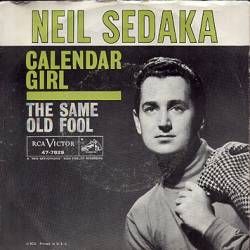
"Alexander's Ragtime Band" is a song by Irving Berlin. It was his first major hit, in 1911.
"All My Trials" is a folk song which became popular during the social protest movements of the late 1950s and 1960s. Alternative titles it has been recorded under include "Bahamian Lullaby" and "All My Sorrows." The origins of the song are unclear, as it appears to not have been documented in any musicological or historical records until after the first commercial recording was released on Bob Gibson's 1956 debut album Offbeat Folksongs.

Pauline Matthews, better known by her stage name Kiki Dee, is an English singer born in Little Horton, Bradford, West Riding of Yorkshire. Known for her blue-eyed soul vocals, she was the first female singer from the UK to sign with Motown's Tamla Records.

Jo Dee Marie Messina is an American country music artist. She has charted six number one singles on the Billboard country music charts. She has been honored by the Country Music Association, the Academy of Country Music and has been nominated for two Grammy Awards. She was the first female country artist to score three multiple-week Number One songs from the same album. To date, she has two Platinum and three Gold-certified albums by the RIAA.

"It Must Have Been Something I Said!" is the fifth comedy album from the Smothers Brothers. It reached number 23 on the Billboard Pop Albums chart. The single "Jenny Brown" peaked at #84 on the 1963 Pop Singles chart. The album was recorded at The Ice House in Pasadena, California. The cover photograph showed Dick having just smashed a guitar over Tom's head, thereby justifying the album title as a word balloon.
"Till" is a popular song with music by Charles Danvers and English lyrics by Carl Sigman, released in January 1957 by Percy Faith. It was derived from the French song "Prière Sans Espoir", released in 1956 by Lucien Lupi on the EP L'Amour Viendra with original French lyrics written by Pierre Benoit Buisson. Italian singer Caterina Valente released a version in 1960 with lyrics by Gaiano.
"Days of Wine and Roses" is a popular song, from the 1962 movie of the same name.

"When I Fall in Love" is a popular song, written by Victor Young (music) and Edward Heyman (lyrics). It was introduced in the film One Minute to Zero. Jeri Southern sang on the first recording released in April 1952 with the song's composer, Victor Young, handling the arranging and conducting duties. The song has become a standard, with many artists recording it; the first hit version was sung by Doris Day released in July 1952.

"True Love" is a popular song written by Cole Porter and was published in 1956. The song was introduced by Bing Crosby and Grace Kelly in the musical film High Society. "True Love" was nominated for the Academy Award for Best Original Song. Kelly's contribution on the record is relatively minor, duetting with Crosby on only the final chorus. Nonetheless, the single is co-credited to her.

Ruby & the Romantics were an Akron, Ohio-based American R&B group in the 1960s. The group had several pop and R&B hit records, topping the US Billboard Hot 100 chart in 1963 with their first recording, "Our Day Will Come". The song, written by Mort Garson and Bob Hilliard, was a worldwide hit, reaching No. 1 and selling over one million copies in the US, also topped the Billboard R&B chart at # 1, and peaked at #38 in the UK Singles Chart. It also reached No. 11 on the Australian Charts.

"Surfin' Bird" is a song performed by American surf rock band the Trashmen.

"Bluebirds over the Mountain" is a song written and recorded in 1958 by Ersel Hickey, later covered by artists such as The Beach Boys, Ritchie Valens and Robert Plant.

"You're No Good" is a song written by Clint Ballard, Jr., first performed by Dee Dee Warwick for Jubilee Records in 1963 with production by Jerry Leiber and Mike Stoller. It has since been covered by many artists, including charting versions by Betty Everett in 1963, The Swinging Blue Jeans in 1964, and Linda Ronstadt in 1975, whose version was a number 1 hit in the United States.

"How Do You Do It?" was the debut single by Liverpudlian band Gerry and the Pacemakers. The song reached number one in the UK Singles Chart on 11 April 1963, where it stayed for three weeks.
"Mashed Potato Time" is a single written and composed by Kal Mann and Bernie Lowe, and performed by Dee Dee Sharp on her debut album It's Mashed Potato Time. The song refers to the Mashed Potato dance move which was a fad at the time. It was one of several that came out at that time, for example, "(Do the) Mashed Potatoes" in 1960. The Marvelettes song "Please Mr. Postman" is mentioned in the lyrics and is copied in the arrangement. In 1996 the Campbell Soup Company used the song in a $30 million advertising campaign, and commissioned a new, more upbeat recording from Dee Dee Sharp.

"Calendar Girl" is a song by Neil Sedaka. The music was composed by Sedaka and the lyrics by Howard Greenfield. Recorded in 1960 and released in 1961, it was a Top-5 hit single for Sedaka, peaking at #4 on the US charts, #3 in Australia, and #1 on the Canadian and Japanese charts.
"Thou Shalt Not Steal" is a song written by John D. Loudermilk and performed by Dick and Dee Dee. It reached #13 on the Billboard chart in 1964. The song was also released in the United Kingdom as a single, but it did not chart. The song was featured on their 1965 album, Thou Shalt Not Steal.
"Turn Around" is a song written by Malvina Reynolds, Alan Greene, and Harry Belafonte and made popular by Dick and Dee Dee. It reached #15 on the adult contemporary chart and #27 on the Billboard chart in 1963. The song was also released in the United Kingdom as a single, but it did not chart. The song was featured on their 1964 album, Turn Around.
"New Orleans" is a song written by Frank Guida and Joseph Royster and performed by Gary U.S. Bonds. It reached #5 on the U.S. R&B chart, #6 on the U.S. pop chart, and #16 on the UK Singles Chart in 1960. It was featured on his 1961 album Dance 'Til Quarter to Three with U.S. Bonds.












